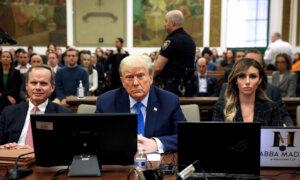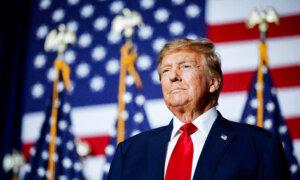The attorneys general filed an amicus brief suggesting the prosecution’s timing is meant to derail the former president’s reelection campaign.
“Amici States represent broad swaths of the public, millions of Americans who are concerned by the prosecution’s zeal to try President Trump before the upcoming presidential election,” wrote the attorneys representing Alabama, Florida, Idaho, Indiana, Iowa, Kansas, Louisiana, Mississippi, Missouri, Montana, Nebraska, North Dakota, Oklahoma, South Carolina, South Dakota, Texas, Utah, and West Virginia.
“Prosecutors purport to represent the People, but their approach toward President Trump suggests ulterior motives,” they argued. “The Court should take seriously the risk that exposing former Presidents to criminal liability will enable partisan abuse.”
Attorneys for President Trump on March 19 argued that presidential immunity is necessary in the context of criminal prosecution to prevent cycles of recrimination and even political “blackmail” of sitting presidents. The Supreme Court has scheduled oral arguments for April 25.
Lower Court Decision
The attorneys faulted an appeals court’s rejection of President Trump’s motion to dismiss based on presidential immunity for ignoring “the obvious” in its decision to cast the former president as “citizen Trump.”
“If he had not been President, none of this would be happening,” the attorneys argued, listing several cases brought against President Trump, including the one before the Supreme Court prosecuted by special counsel Jack Smith.
Mr. Smith has charged President Trump with four counts of obstruction and conspiracy for his actions on Jan. 6, 2021, and the amici attorneys question why the Department of Justice waited so long to bring this case if not for political reasons. They noted that Mr. Smith was appointed days after President Trump announced his candidacy.
After the alleged delay before indictment, prosecutors then rushed the case, the attorneys argued.
“No criminal defendant but this one is forced to brief a novel constitutional issue in a few weeks, to oppose a petition for certiorari before judgment, to forgo en banc review, and more,” the brief reads.
“The prosecution’s failure to explain its extraordinary haste suggests one troubling answer: That the timing of the prosecution is designed to inflict maximum damage on President Biden’s political opponent before the November 2024 election.”
The appeals court had opined that the threat of partisan prosecution would be rare, because prosecutors have “ethical obligations not to initiate unfounded prosecutions,” and therefore the risk to former presidents being “unduly harassed by meritless federal criminal prosecutions appears slight.”
Amici attorneys argued the current situation President Trump faced showed that risk was “anything but ’slight,’” and the risk was one the Founding Fathers had “frequently worried” about.
Their concerns that “passions and animosities” driving partisan factions would endanger the public good led to the separation of powers, the attorneys argued. Presidential immunity is necessary to preserve that balance, and impeachment holds them accountable to the people, they added.
“It would be an injustice for the courts to treat President Trump like ‘any other criminal defendant’” they argued, citing an appellate decision on presidential immunity, “while the prosecution plainly does not.”
Attorneys Criticize Comparison to Nixon
The attorneys claimed the lower court erred when it found that a politically motivated prosecutor would not target a president as soon as he left office, and the ruling effectively “tipped the scales for the prosecution” in the current case.
The appeals court compared presidents to jurors who may fear recrimination after passing a verdict.
“But the comparison is utterly inapt. What is the baseline risk that a prosecutor would target a juror for personal or political gain? The court did not say,” the amici attorneys argued, adding that the sheer visibility of a president and his decisions makes him an “easily identifiable target.”
The appeals court also compared the current case to past cases such as that of President Richard Nixon, who obtained a pardon after leaving office, finding that this meant presidents already believe they can face criminal prosecution.
The amici attorneys argued this was mere inference and that “none of the Presidents cited actually admitted his amenability to criminal prosecution after leaving office.”
No sitting or former president has been subject to criminal prosecution, much less the four criminal indictments in separate jurisdictions that President Trump faces. The lack of historical record could lead a president to infer immunity, the amici attorneys argued.
Original News Source Link – Epoch Times
Running For Office? Conservative Campaign Consulting – Election Day Strategies!


